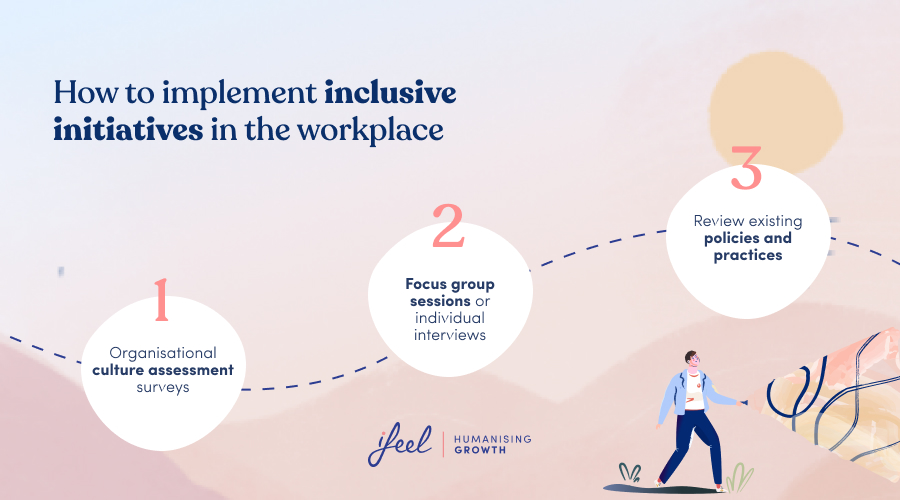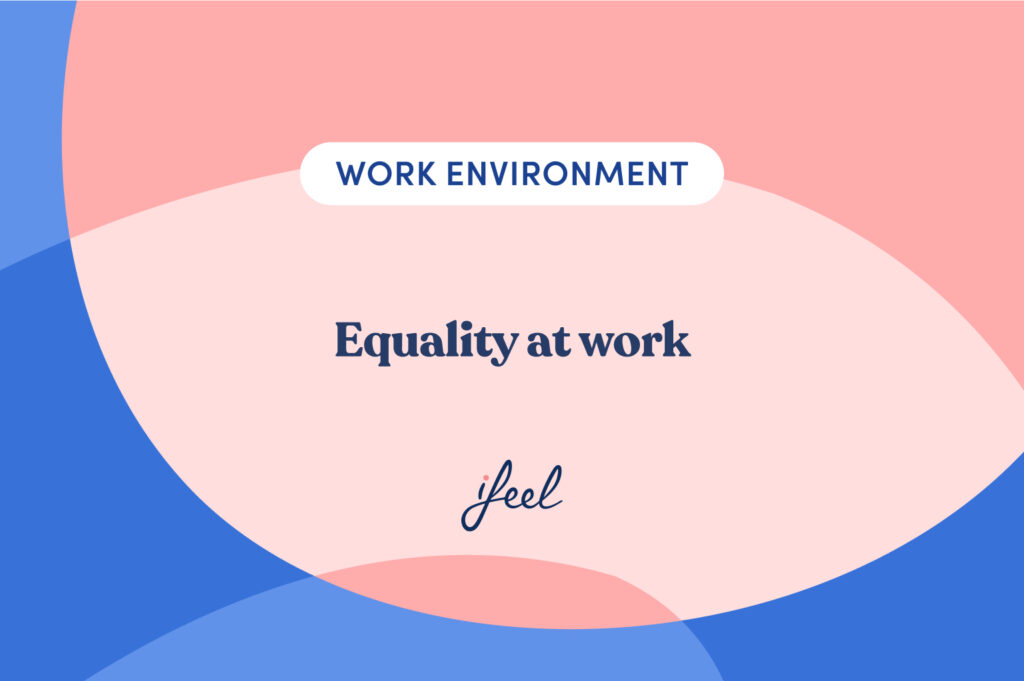Equality at work is not merely an ethical concern; it’s a strategic imperative influencing organisational success on multiple fronts. While gender inequality is inherently unjust, its implications stretch beyond morality by affecting productivity, efficiency, and employee morale.
Despite notable advancements toward gender equality at work, persistent disparities continue to pose significant challenges, resulting in social injustice, financial losses, and psychological distress for the affected women.
As a decision-maker, what are you doing to create an healthy and equitable work environment?
The importance of equality at work
Achieving equality at work is fundamental for fostering a culture of team cohesion, mental well-being, and talent retention. Discrimination, which is both unfair and detrimental to organisational success, exacerbates the work experience for many employees, particularly affecting women’s mental health. Research shows that women are almost twice as likely as men to report feeling discriminated against because of their gender.Numerous instances of unequal treatment, pay discrepancies, and limited opportunities for women highlight the pressing need for comprehensive equality initiatives. Addressing these inequalities not only ensures justice but also enhances organisational performance.
In essence, prioritising equality at work is not just about doing what is right but also about making strategic decisions that drive business success and innovation. A commitment to equality can transform organisational culture and lead to sustainable growth.
Causes of workplace inequality
Understanding the roots of inequality at work is crucial for crafting effective solutions. Several factors contribute to this issue:
Here’s the content structured into a table:
| Causes of inequality at work | Description |
|---|---|
| Cultural norms and stereotypes | Often, deep-seated cultural beliefs about gender roles seep into workplace practices, reinforcing gender disparities and influencing perceptions of capability and potential, often to the detriment of women. |
| Bias in hiring and promotions | Unconscious biases can significantly skew decision-making processes, leading to fewer opportunities for women to ascend to leadership roles. This bias often manifests subtly but consistently, hindering equality at work. |
| Lack of representation | The scarcity of women in leadership positions creates a cycle where aspiring female leaders lack role models and mentors, perpetuating a status quo that limits diversity at higher organisational levels. |
| Inadequate policies | Many organisations lack comprehensive policies to promote equality and inclusivity. Without clear guidelines and enforcement, disparities can become entrenched in organisational culture. |
By addressing these root causes, organisations can begin to dismantle the barriers that prevent equality at work, paving the way for a more inclusive and dynamic work environment.
Overcoming cognitive biases with ifeel’s resources
The “Handbook for HR Managers: Cognitive Biases” is a vital tool for tackling cognitive biases and promoting equality at work. This resource provides HR professionals with practical strategies to identify and mitigate biases, ensuring fair decision-making in hiring and promotions.
By implementing the insights from this guide, organisations can enhance diversity and foster an inclusive workplace culture. Download the Handbook for HR Managers: Cognitive Biases for a more equitable future.

Consequences of inequality
The ramifications of inequality at work are profound and multifaceted, affecting both individuals and organisations:
- Reduced employee engagement: Inequality often leads to disenchantment and disengagement, reducing employee motivation and commitment, which in turn affects overall productivity.
- Increased turnover rates: Discrimination and lack of opportunity encourage talented individuals to seek employment elsewhere, increasing turnover costs and disrupting organisational continuity.
- Negative impact on mental health: Continuous exposure to inequality and bias significantly affects the psychological well-being of employees, particularly women, leading to stress and diminished job satisfaction.
- Reputational damage: Organisations known for gender inequality struggle to attract top talent and risk damaging their reputation in the industry and community.
Ultimately, the persistence of inequality at work not only undermines employee well-being but also compromises the long-term success and competitiveness of the organisation.
Addressing workplace inequality
To counter inequality at work effectively, organisations must implement targeted strategies that address both systemic issues and individual behaviours. This involves a strategic approach that focuses on policy development, cultural change, and individual empowerment:
1. Develop clear policies: Establish and rigorously enforce policies that promote equality and discourage discrimination. Policies should be transparent, actionable, and regularly reviewed to ensure effectiveness.
2. Bias training: Implement regular unconscious bias training to heighten employees’ awareness. This comprehensive and continuous training should foster an inclusive environment and mitigate biased decision-making.
3. Mentorship and sponsorship programs: Encourage robust mentorship and sponsorship programs to support women and minorities in achieving leadership positions. These programs should facilitate networking, skill development, and career advancement.
4. Transparency in compensation: Ensure transparency in salary structures to identify and rectify gender pay gaps. Regular audits and reporting can help maintain accountability and drive equitable compensation practices.
5. Flexible work arrangements: Implement flexible work arrangements that accommodate diverse life situations, supporting a healthy work-life balance for all employees.
Quick assessment for decision-makers
Decision-makers can use the following checklist to evaluate their organisation’s commitment to equality at work:
| Assessment area | Description | Yes/No |
|---|---|---|
| Policy Review | Are there clear, enforced policies promoting equality within the organisation? | |
| Diversity metrics | What are the statistics on gender representation at various levels, and how do they compare to industry standards? | |
| Employee feedback | How do employees perceive the organisation’s commitment to equality and inclusion? | |
| Training programs | Are there regular and effective training programs on unconscious bias and diversity? | |
| Mentorship opportunities | Are mentorship and sponsorship programs in place to support underrepresented groups in leadership roles? |
By regularly assessing these areas, decision-makers can ensure their organisation remains committed to fostering an inclusive and equitable workplace.
In conclusion, achieving equality at work requires deliberate and sustained effort across all levels of an organisation. By tackling root causes, implementing strategic measures, and fostering an inclusive culture, companies can unlock the full potential of their workforce, leading to enhanced innovation, productivity, and long-term success. Recognising and valuing diversity is not just a moral obligation but a strategic advantage in today’s competitive global market.
The Leadership Lens🔎
To effectively drive equality initiatives, leaders must allocate resources strategically. This involves ensuring that sufficient resources are dedicated to training, policy development, and support programs that cultivate a diverse workforce. Moreover, regular evaluation of these initiatives using clear metrics is vital. By constantly assessing progress, leaders can identify areas for improvement and make necessary adjustments to ensure the sustained success of equality efforts within the organisation.
Mental health: The biggest business challenge of our time
At ifeel, we recognise that addressing equality at work is not just a moral obligation, but a strategic necessity for long-term success.
To help in this process, our clinical team provides leading companies in their sector with a dynamic, scalable and fully personalised solution, powered by AI. We have a strategy and approach based on key data to help organisations with a global presence address one of the biggest business challenges of our time: mental health at work.
This solution offers employees a mental health care service structured at different levels depending on their needs at any given time. Discover our Resources section, where you will find various materials, such as webinars, podcasts, guides for human resources on current topics, and interviews with leaders of large organisations.
Data-driven methodology
Our mental health solution for enterprises employs evidence-based practices and innovative methods, backed by the latest research and a network of over 600 mental health professionals. Would you like to know more about our Clinical Research Department? Don’t forget to visit this section to stay informed about the latest studies and research on mental health in corporate environments.
We hope you found this article on equality at work interesting.
If you would like more information, simply request it here. Our team will calculate the ROI based on your enterprise’s specific characteristics.










